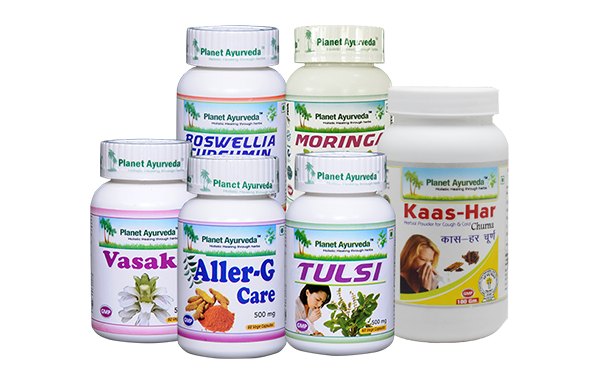Natural Treatment for Non-Specific Interstitial Pneumonia
Abstract
Lungs are the pair of respiratory organs present on both sides of our body which helps us to breathe and gives us life. There are tiny sacs inside the lungs called alveoli covered with interstitial cells that inhale oxygen and exhale carbon dioxide. There is a variety of disease-related to lung disorders and one of those is interstitial lung disorder. This causes the scarring of the lungs and leads to difficulty in breathing and low levels of oxygen in the bloodstream. There are many types of interstitial lung disease and one of these is Non-Specific Interstitial pneumonia (NSIP) and we are going to discuss it more.
What is NSIP?
Normally we all know that pneumonia is the infection of the lungs caused by a bacterial or either viral infection. This infection results in the air sac to be filled with fluid. So the same happens in the case of NSIP but the differences are that it affects the interstitial tissue surrounding the air sac and separating all of them from each other. NSIP is seen in very rare cases that cause difficulty in exchanging gases. In interstitial pneumonia the web-like walls present on the alveoli get inflamed and if left untreated cause fibrosis which may end up in death. NSIP is caused by some long-time exposure to chemicals or patients taking certain types of medications, especially people who have HIV.
There are two types of NSIP:
- Cellular:- The cells of the interstitium are inflamed or the hyaline membrane is absent.
- Fibrotic:- This causes permanent scarring of the lung tissue.
Scarring means fibrosis which cannot be reversed. It is difficult for the patient to breathe properly in this case which results in hypoxia (low levels of oxygen). In some cases, both scarring and inflammation can be presented at the same time.
What Symptoms are Seen in NSIP?
There are few common symptoms presented and these are as:
- Dyspnea (Shortness of breath) on exertion
- Severe dry cough
- Easily gets tired
- Weakness
- Fatigue
- Vomiting
- Feeling of nausea
- Fever
- Sharp pain in the chest as if someone is stabbing
- Due to lack of oxygen, clubbing can also be seen
- Finger tips become enlarged
- Loss of appetite
- Rapid weight loss
- Confusion of mind
- It may lead to both heart and respiratory failure.
What is the Cause for NSIP?
This is caused due to some kind of injury to the lung which leads to abnormal healing. Normally, the body creates the right number of tissue to repair the damaged lung tissue. In NSIP this repairing process is disturbed and the tissue surrounding the alveoli starts to get thickened and further scarring can also be seen which almost makes it difficult for the patient to pass oxygen throughout their bloodstream. This can be triggered by many factors like inhalation of toxins through the workplace and smoking. Exposure to things like Grain dust, Radiation, Asbestos fibers, and Silica dust is a common cause of lung disease.
Some common risk factors to develop NSIP:-
- Age:- Mostly seen in people between the ages of 40 to 5o.
- Factors related to occupation or environment:- People who work in specific places where they have to get exposed to harmful chemicals like asbestos are likely to have the disease.
- People who have constant digestion problems or acid reflux are also at risk.
- History of severe smoking is also one of the reason in fact smoking is dangerous to anyone and can lead to any kind of respiratory disease even cancer
- Long time exposure to chemotherapy or radiation due to some problem is also counted as the cause for NSIP.
How NSIPcan be Diagnosed?
- History of the patient:- It is important to know where they used to work or any habit of smoking in the past which will help to determine the cause.
- CT Scan:- This will help in diagnosing the fibrosis or scarring on the lungs.
- Pulmonary functioning test:- This test helps in determining the capacity, rate of flow, the volume of the lung, and also the amount of gas exchange.
- Bronchoscopy:- It will help to visualize the airway through the help of a camera. This will confirm the cause and diagnosis of the patient.
Treatment for NSIP
NSIP is a type of Interstitial disease which appear similar in features with Shwas Roga in Ayurveda. According to Ayurveda, we are made up of three elements Fire (Pitta), Water (Kapha) and Air (vata). In the case of this disease, all the three elements or Dosha are violated which along with Ama (Toxins) causes the blocking of various srotas (Channels). Ayurveda treats the patient depending on the stage of the disease and the patient’s body type. Panchakarma along with bitter-tasting herbs will treat the patient as a whole and will balance the Dosha.
Best Herbal Formulation for NSIP by Planet Ayurveda
We made herbs that are 100 percent natural and vegetarian. All the herbal remedies are made under the supervision of MD Ayurvedic Doctors. They are free from chemicals, preservatives, and additives. These herbs are free from any side effects that is what makes it safe to use. We have a special ILD (Interstitial lung disease) pack. The medicines included in this pack by our experts’ are:
- Boswellia Curcumin
- Moringa Capsules
- Kaas-Har Churna
- Tulsi Capsules
- Vasaka Capsules
- Aller-G Capsules

 Products Description
Products Description
1. Boswellia Curcumin
It is made from two herbs called Shallaki (Boswellia serrata) and Curcumin (Curcuma longa) both of them are very effective in lung disorders. It is one of the effective combinations of the anti-inflammatory herbs. This helps in treating Cellular type of NSIP where inflammation of interstitial cells takes place.
Dosage:- two capsules daily with water after meals.
2. Moringa Capsules
This is an excellent herb that is found all over Asia. Moringa contains antioxidant, antibacterial and antiviral properties. This is helpful in reducing the fluid from the air sacs and overall proves to be good herbs for lungs along with better breathing.
Dosage:- One capsule twice daily with water.
3. Kaas-Har Churna
This churna is formulated with herbs like Ela (Elettaria cardamomum), Pippali (Piper longum) and many more which is effective in any kind of cough and cold. Both of these ailments are very severe in NSIP patients. These are the natural herbs that safely treat the disease.
Dosage:- One teaspoon thrice daily with honey.
4. Tulsi Capsules
These capsules are made from an herb called Tulsi (Ocimum sanctum) which is also known as holy basil and is very commonly found in India. This is one of the herbs that is effective in treating any kind of respiratory tract infection and especially NSIP. It is useful in related ailments like sore throat, cough, and any kind of allergic reaction.Will also treat disorders like asthma by boosting immunity.
Dosage:- Two capsules daily with water.
5. Vasaka Capsules
It is the herbal formulation of a single herb called Vasaka (Adhatoda vasica) which is effective in lung diseases like cough, bronchitis, and asthma as well. Vasaka will give strength to lungs and this herb gives good results in tuberculosis too.
Dosage:- Two capsules twice daily with water.
6. Aller-G Capsules
This is the remedy that contains herbs like Ashwagandha (Withania somnifera), Neem (Azadirachta indica) etc. which contains anti-inflammatory and anti-allergic properties. It is especially useful for people who have developed NSIP due to constant exposure to harmful chemicals. Aller-G helps in removing the Ama (toxins) from the body and opening the blocked channels.
Dosage:- One capsule twice daily with water.
Tips for patients with lung problem:-
- Add fruits and vegetables in your diet especially ones that are bitter in taste like bitter gourd or drumstick.
- Consume red lentils, porridge, and rice in your diets.
- Avoid eating chickpeas.
- Junk food should be avoided totally.
- Do not drink contaminated water at all.
- Avoid smoking as it would only worsen the case.
- Do Yoga and especially do breathing exercises (pranayam).
Conclusion
If you want to breathe the fresh air and want to strengthen your lungs ILD pack is the best combination of herbs to treat your NSIP. All these herbs are clinically tested and won’t cause any problem and have greater efficiency to treat various lung diseases including non-specific interstitial pneumonia.





